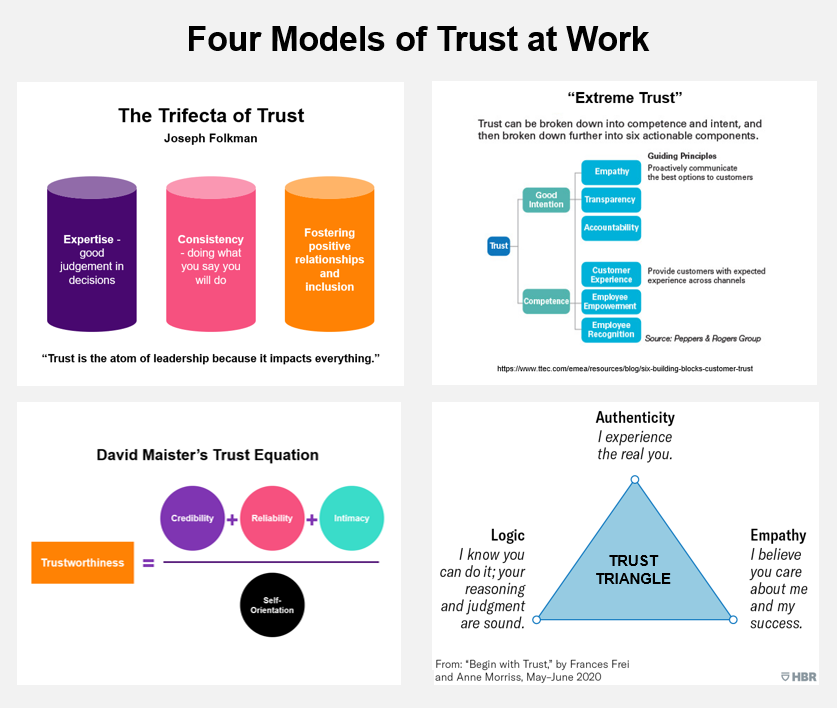Here’s a trust recipe. (Although, it’s key to remember that trust is contingent and dynamic).

What matters for trust?
Here are four models I’ve shared recently. All of them resonate with me for different reasons.
🟦 David Maister’s Trust Equation
If you stand back, you can identify some common ingredients. Here’s a “Trust Recipe”:
- Communication: Sharing information, providing clear expectations, and listening actively
- Consistency: In actions, policies, and decision-making processes
- Integrity: Acting with honesty and fairness, and following clear values, even when it’s difficult (especially when it’s difficult).
- Competence: Demonstrating the ability to perform job responsibilities effectively and efficiently
- Reliability: Following through on commitments and promises
- Supportiveness: Offering help and support to people and being receptive to their ideas and concerns
- Respect: Showing consideration for the feelings, values, and ideas of others
- Fairness: Applying rules and policies impartially and justly
- Recognition: Acknowledging and appreciating people’s contributions
- Confidentiality: Respecting privacy and handling sensitive information with discretion
- Empathy: Understanding and sharing the feelings of others
- Vulnerability: Leaders who are willing to show their own vulnerability, admitting mistakes and limitations, can create an environment where trust thrives
- Empowerment: Giving employees autonomy and trust in their decision-making can empower them and build reciprocal trust
- Psychological Safety: Making sure people can speak up, that they can disagree, that they can take risks and admit mistakes
- Constructive Feedback: Providing helpful, non-judgmental feedback at the right time and in the right place.
There are a few other key points I’d make about any recipe for trust. Trust is hard to define because it is contingent (it always depends on the context) and dynamic (it changes based on the nature of a relationship). You need to keep in mind that:
- Trust is a process, meaning there are phases and episodes through which trust is formed and eroded. As such, trust is cumulative, the sum of personal experience and recurring exchanges. There are key moments when trust is tested by critical incidents. And there are conditions that lead to trusted relationships being more likely to form at those key moments.
- For example, trustors need to have a propensity to trust and a degree of vulnerability, which is the partly a result of personal characteristics, norms and also incentives.
- In addition, trustees need to have earned some degree of trustworthiness, which is the result of an assessment of their competence, integrity and benevolence.
- Because an assessment is required, trust is cognitive. In other words, it is based on what I know. Once I have relevant knowledge of your character, your competence, your reliability, then my knowledge constitutes my degree of trust or distrust. In this way, transparency and openness, as well as misinformation and bias, can influence trust. For Russell Hardin, at the heart of a trusted relationship is the knowledge of encapsulated interests. By this he means: “I know you have an interest in fulfilling my trust in you (you encapsulate my interest in your own)”.
- Trust is also a form of social capital within a group or a community. It depends on reciprocity and exchange. Francis Fukayma emphasises the importance of what he calls “spontaneous sociability”. For Fukuyama, “trust is the expectation that arises within a community of regular, honest, and cooperative behaviour based on commonly shared norms, on the part of other members of that community.”
Given all of the above, Mayer et al provide an integrative model of trust which pulls together these different strands. They define trust as “the willingness of a party to be vulnerable to the actions of another party based on the expectation that the other will perform a particular action important to the trustor, irrespective of the ability to monitor or control that other party”.
References:
Hardin, Russell. Trust. Cambridge: Polity, 2006.
Fukuyama, Francis. Trust: The social virtues and the creation of prosperity. Free Press Paperbacks, 1995.
Schoorman, F. David, Roger C. Mayer, and James H. Davis. “An integrative model of organizational trust: Past, present, and future.” Academy of Management Review 32.2 (2007): 344–354.
#Trust #EmployeeEngagement #EmployeeExperience